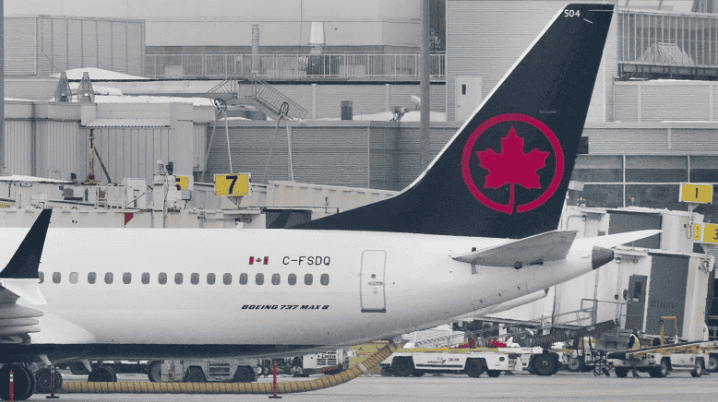
Simulator training could lead to swifter resumption of Max service when the grounding ends
Air Canada topped expectations in its latest quarter, but said Monday the Boeing 737 Max grounding and political tensions between Canada and China weighed on its results.
“The impact on our unit cost is expected to increase the longer the grounding persists, particularly heading towards the busy summer season,” chief financial officer Michael Rousseau said.
He cited a reduction of seat capacity of between three per cent and four cent due to the grounding, which continues across the globe as the Max jetliner’s flight control system remains under scrutiny following two deadly crashes.
Less fuel-efficient replacement aircraft and the cost of extended plane leases will also hurt the bottom line, Rousseau said.
Chief commercial officer Lucie Guillemette said Canada’s ongoing dispute with China stemming from the arrest of Huawei CFO Meng Wanzhou last year has hurt travel demand between the two countries.
“However, reallocating capacity from China to other markets has helped mitigate the impact,” she said on a conference call with investors Monday.
8,000 flights cancelled
Air Canada cancelled a total of 8,000 flights last quarter, 1,600 of which were on its higher-revenue mainline routes — a 40 per cent increase in mainline cancellations from the first quarter of 2018, chief executive Calin Rovinescu said.
The airline’s 24 Max 8 jetliners comprise about 20 per cent of its narrow-body fleet and carry between 9,000 and 12,000 passengers per day, he added.
Adjusted cost per available seat mile, a key industry metric, increased 3.2 per cent. The rise was caused in part by the grounding, which affected the final 18 days of the first quarter, executives said.

Transport Minister Marc Garneau recently said he’d like Canadian pilots to undergo simulator training related to the 737 Max software revision, a step beyond an FAA-appointed board’s proposal for computer-based training.
Air Canada says it is the only North American airline with Max simulators, which could lead to swifter resumption of Max service when the grounding ends.
“These pilots are not just sitting around sort of doing nothing. We’re actually able to have some simulator training for them…including having modeled some of these scenarios that occurred in the two accidents,” Rovinescu said.
Some of the pilots who usually fly the 737 Max have also been assigned to other planes.
Safety concerns continue to hang over the Max aircraft after Boeing said a safety alert sensor malfunctioned on an Ethiopian Airlines flight last March and a fatal Lion Air crash off the coast of Indonesia in October. The two flights, both on Max 8s, killed a total of 346 people, including 18 Canadians on board the Ethiopian Airlines flight.
Favourable foreign exchange
The Montreal-based carrier said Monday it earned $345 million or $1.26 per diluted share for its first quarter, compared with a loss of $203 million or 74 cents per diluted share in the same quarter a year ago.
Air Canada said the results included foreign exchange gains of $263 million in its most recent quarter compared with foreign exchange losses of $197 million in the first quarter of 2018.
On an adjusted basis, the airline said it earned $17 million or six cents per diluted share in the quarter compared with an adjusted loss of $26 million or 10 cents per diluted share a year ago.
Operating revenue rose to $4.45 billion compared with $4.07 billion in the first three months of 2018.
Analysts on average had expected a loss of 18 cents per share and revenue of nearly $4.39 billion for the quarter, according to Thomson Reuters Eikon.


